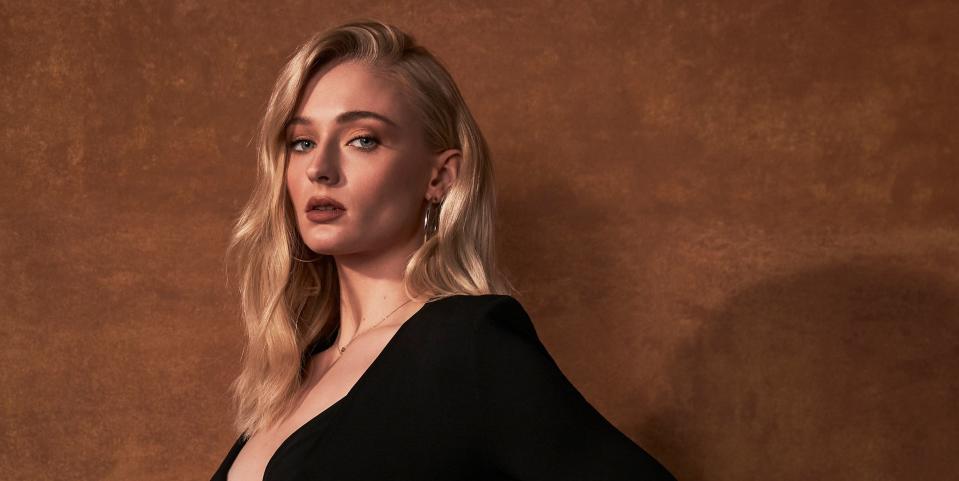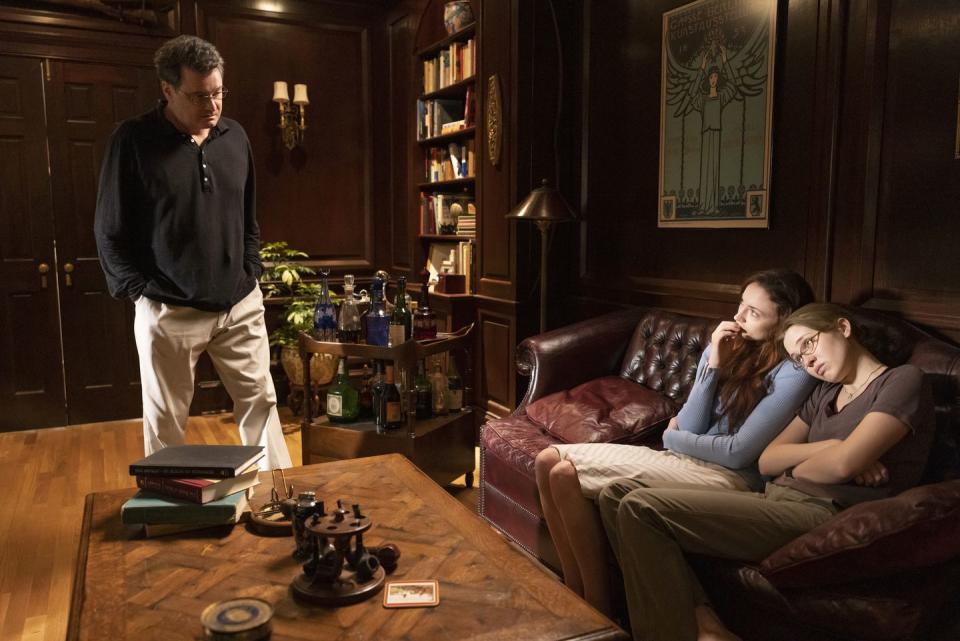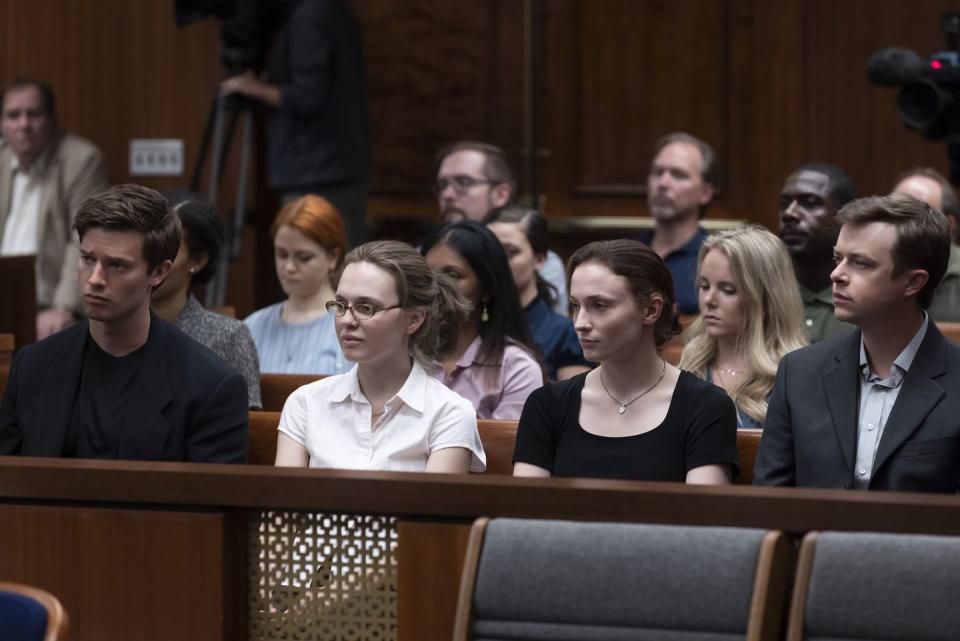Sophie Turner Loves True-Crime Stories. Now, She’s Starring in One

Sophie Turner has always loved the true-crime genre. “I find myself completely drawn to it and utterly fascinated by it. I don’t know why it’s become such a thing, but I love it,” the actress shares with a soft chuckle. “I’m invested, I’m in it. Keep them coming!”
Turner, who grew up before millions of viewers as the tragic heroine Sansa Stark on the smash-hit series Game of Thrones, has returned home to HBO in The Staircase—a dramatized account of the Michael Peterson trial. Peterson, an American novelist, was tried, convicted, and sentenced to life in prison for the murder of his second wife, Kathleen Peterson, who was found dead at the bottom of a flight of stairs. In a twist even stranger than fiction, it was revealed that Elizabeth Ratliff, a friend of the Peterson family, died from a similar fall down the stairs in 1985 in Germany.
Turner plays Margaret Ratliff, who Michael adopted after the death of her mother and father. She relished the first-time challenge of playing a nonfictional character. “That was a whole different kind of ball game for me. We were very, very, very lucky to be able to have our director in touch with quite a few members of people who were involved in the case, Margaret being one of them. She was kind of a point of information to do with the family, for (executive producer) Antonio Campos and for all of us.”
Though the real Margaret added nuance and context to her onscreen depiction, Turner had no personal contact with her. “She just wanted to keep it to herself and Antonio, and didn’t want to quite have those sit-down, in-depth discussions with me, which I completely understand and respect. I think this is, like, one of the most traumatic times in her life, and I was not going to push.”
Ahead, BAZAAR.com sits down with Turner via Zoom to discuss her new role further, her thoughts on the U.S. justice system, and what she hopes viewers of The Staircase will walk away with concerning the Michael Peterson trial.
How familiar were you with the Michael Peterson case before you signed on to this project?
The first I heard about it was the documentary. When the documentary came out on Netflix, I became completely obsessed like the rest of the world. I was on all the forums and looking up all the discussions that were having theories and speculation. I'm a true-crime fan so I was really invested. Then, I found out that they were making the show, so I was ready to go.

What was so striking in watching both the documentary and the dramatized series is that Margaret has this unwavering faith in Michael's innocence, especially when it was revealed that he is bisexual and Margaret says, "I don't care about that." What are your thoughts on how his sexual orientation impacted the trial? Did you feel that there was some sort of negative bias?
Absolutely. I think back then, what is it, just over 10 years ago, people were using that kind of thing as ammunition against someone in a trial. Of course, there were biases towards him because of that. To be honest, I think it's completely unrelated and unnecessary, and I think there's always going to be some kind of discrimination towards people, especially men in the LGBTQIA community.
Margaret has really only had two constants in her life: her sister, Martha, and Michael, who's been there since day one. I think the idea for her of losing her father is too frightening for her to comprehend. I think she puts aside what her opinions might be and is kind of just grasping on for dear life and keeping faith in her father. It's almost like Stockholm syndrome, I think. He's been her savior. He was the one who adopted her, kept her and her sister together. We'll see that play out in the series. He's her "super dad," as she says in the show, and I think the idea that he might not be that is too terrifying for her to want to explore.
What's so interesting about The Staircase is that viewers will walk away not knowing if Michael is truly innocent or guilty, but there's a definite point of view on the American justice system. What are your personal views?
I think the American justice system is absolutely corrupt, and that's nothing new to any of us. That's the main reason that Michael is not sitting in jail right now. It's because one of the district attorney's witnesses was caught lying about the case. And the use of Michael's sexuality as ammunition against him is another example of it. It's layer upon layer of corruption, which is exciting for us, because we feel we're not telling something that's already been told in this show. We're telling a whole new story, a whole new truth.
This series also tackles the court of public opinion, which has been heightened by social media. As a celebrity, how have you been able to navigate rumors about you and loved ones that aren't even true?
You just kind of have to grin and bear a lot of it. I think you just have to sit down and be quiet and accept that a lot of untrue things will come out. Most of the time, it's about, "Well, I don't want to draw attention to a lie, so I just won't speak out on it." But then, in doing that, you almost accept the lie as a truth because you don't stand up for yourself. Obviously, the stakes are a lot higher with this trial, with this story that we're telling, but there's definitely a relation there.

Colin Firth and Toni Collette play your parents. What was it like working with them, and what did you learn from them as far as their work ethic?
Working with both of them has been an absolute dream of mine for years. Watching Toni on set and the way that she conducts herself is so inspiring to me. She is obviously one of the best actresses that we have. She's a boss. She walks onto that set, and she knows what she wants, she knows what can be done in the time that's been given. She's been working in this industry for decades, and she expects a high level of professionalism out of you. That is something that I think every set needs: Someone who takes control and is in charge and knows what she's talking about. I was just absolutely inspired to see her work ethic. What a wonderful woman.
Colin is just the loveliest human being. I really couldn't believe that I was getting, like, a front-row ticket to seeing Colin completely transform the way he does with Michael Peterson. I couldn't believe how lucky I was to be able to witness that up close. When you're in the presence of both Toni and Colin, and they're doing their thing, you know you're in the presence of, like, some real, true acting greatness.
Lastly, what do you hope viewers will walk away with watching this series, as far as Michael Peterson and the U.S. justice system overall?
I hope viewers walk away being able to see who Kathleen Peterson was as a person and what she was like. I think we've heard this tale a million times of the man who potentially pushed his wife down the stairs, but we haven't really heard much about her and who she was and what her life was like.
The other thing would be the repercussions that come with assumption and presumption. With this trial, with this case, with this incident that happened, there has been layer upon layer of assumption and presumption and bias and corruption. The danger of assumption is very clear in this telling, and I hope viewers walk away realizing you're now seeing the family and how that affects the people that are on the edge of this nucleus of this case, and seeing the effects and the ripple effects of it is incredibly profound. I think it's something that we'll walk away from thinking a little bit more about what we assume and what that can lead to.
This interview has been condensed and edited for clarity.
You Might Also Like

